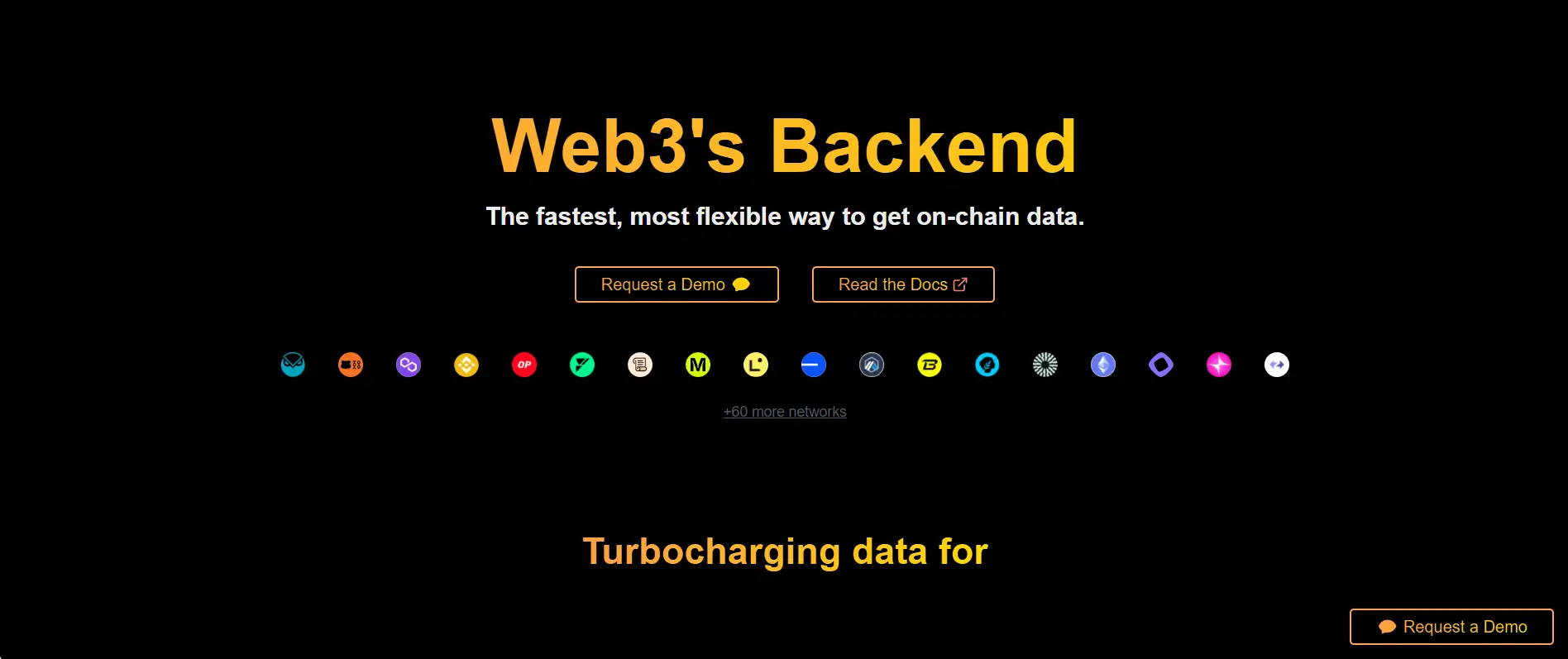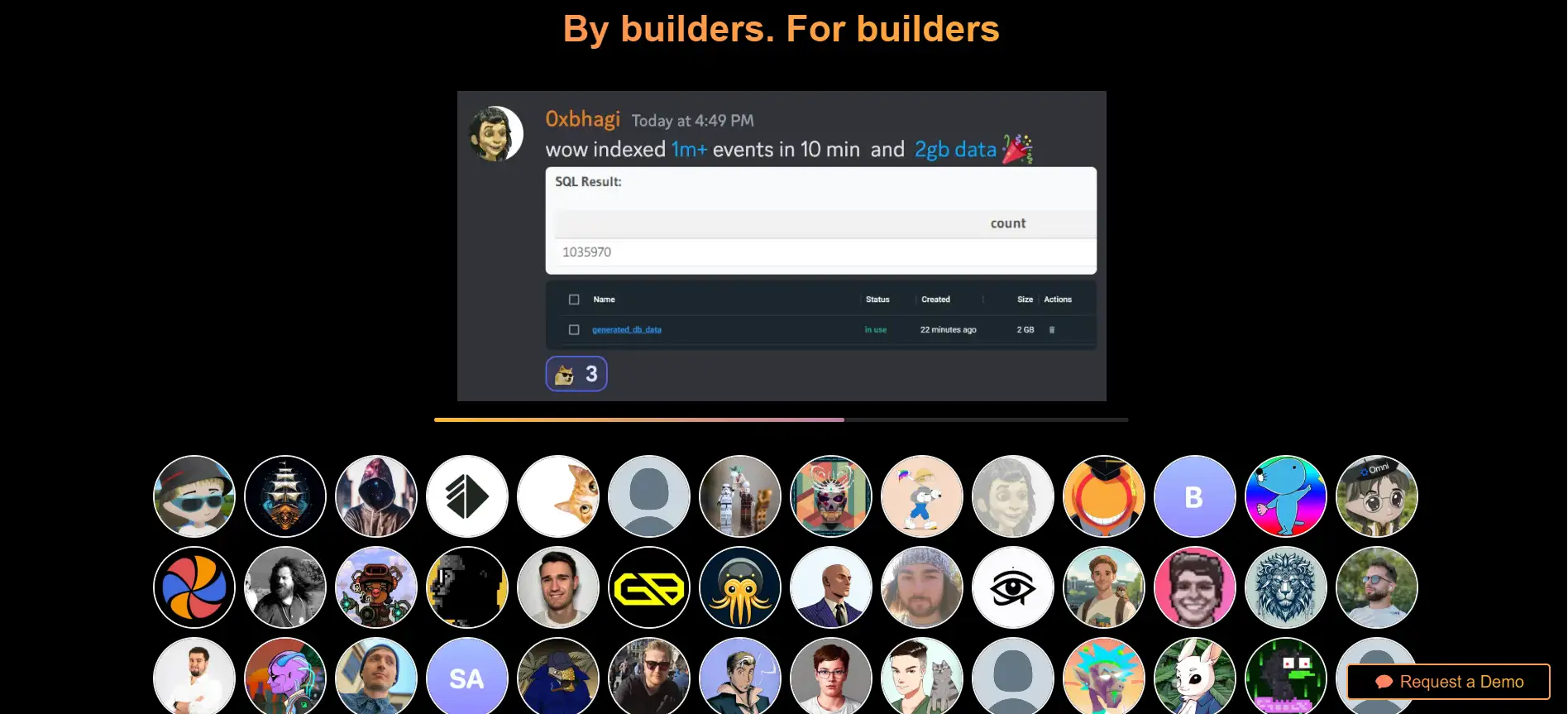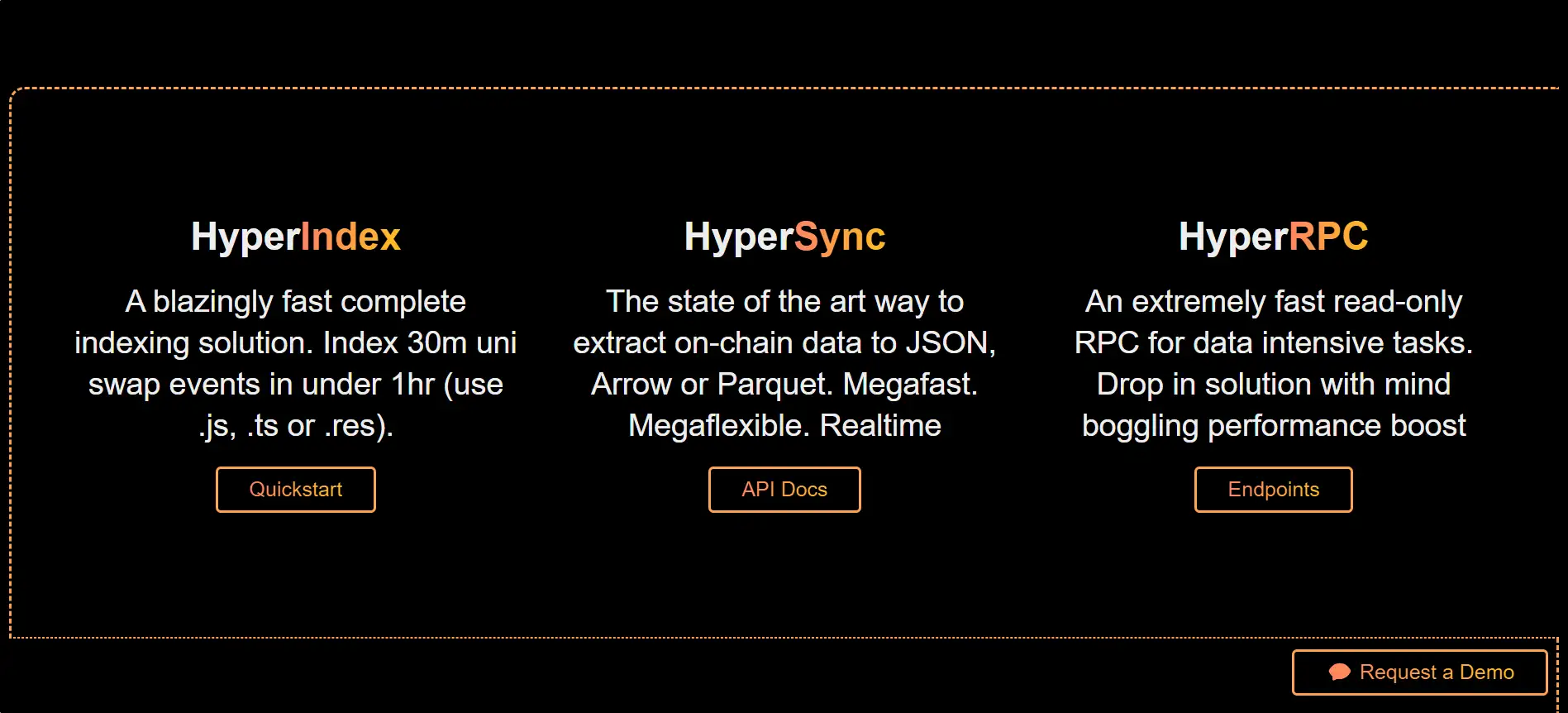About Envio
Envio is a high-performance backend infrastructure platform for Web3 developers, offering the fastest and most flexible way to access, index, and query blockchain data. Designed to eliminate the traditional pain points of blockchain data retrieval, Envio empowers developers to ship applications with millisecond-latency data pipelines across 70+ blockchain networks.
The platform's mission is to deliver blazingly fast data indexing and retrieval for dApps, protocols, and analytics platforms. Whether building a blockchain explorer, DeFi dashboard, or token distribution service, Envio provides all the core tooling—like indexing, GraphQL APIs, real-time sync, and multichain support—to make blockchain development faster, more efficient, and scalable across ecosystems.
Envio was created to address a core infrastructure bottleneck in the Web3 ecosystem: slow and fragmented blockchain data access. Traditional RPC endpoints and indexing services often suffer from high latency, poor scalability, and complex deployment workflows. Envio solves this with its two flagship offerings: HyperSync and HyperIndex.
HyperSync is a Rust-powered data engine that can scan up to 200 million blocks in 10 seconds, delivering up to 2000x faster performance than conventional RPC endpoints. It supports direct blockchain log decoding, selective data extraction, and integration into languages like Python, Node.js, Rust, and Go. HyperIndex, built on top of HyperSync, offers a full indexing framework with GraphQL APIs, schema management, and support for 100,000+ factory contracts. Together, they form a unified stack that powers applications like v4.xyz, Sablier, ChainDensity, Scope.sh, and more.
In performance benchmarks, Envio processes 30 million Uniswap events in under an hour—making it 15x to 158x faster than competitors like Subsquid, Sentio, and The Graph. The platform supports over 70 blockchains including Ethereum, Polygon, Optimism, Arbitrum, zkSync, Blast, Fuel, Base, Linea, and Berachain. This multichain compatibility gives developers a comprehensive backend for querying and syncing on-chain activity across ecosystems from one source.
Envio is trusted by clients such as Gnosis, Sablier, Velodrome, Azuro, Gitcoin, Euler, and Pimlico, and is backed by leading Web3 investors like IDEO CoLab Ventures, Maven11 Capital, MetaCartel, Paribu Ventures, and Rabacap. With deep developer documentation, quickstart CLI tools, and hosted or self-deploy options, Envio is redefining the standard for Web3 backend infrastructure.
Envio delivers groundbreaking features and advantages for blockchain developers:
- HyperSync Engine: Scan and decode on-chain logs across 70+ networks at up to 2000x the speed of standard RPC endpoints.
- HyperIndex Framework: Rapidly build GraphQL-based blockchain indexers with schema control, reorg handling, and event filtering.
- Multichain Indexing: Aggregate data from Ethereum, zkSync, Fuel, Polygon, Arbitrum, Base, and many more—via one API.
- Real-Time Querying: Deliver lightning-fast user experiences with live synced data, reducing frontend latency to near zero.
- Developer Flexibility: Write event handlers in JavaScript, TypeScript, ReScript, Python, Go, or Rust—based on your stack.
- Hosted & Self-Hosted Options: Use Envio’s scalable cloud or deploy privately via Docker in minutes.
- CLI Tools & Templates: Initialize indexers instantly using CLI commands and smart contract templates.
- Pricing Efficiency: Tiered plans based on bandwidth and data usage with a free tier available until mid-2025.
Getting started with Envio is streamlined for both beginners and advanced Web3 developers:
- Try HyperSync: Visit the HyperSync page to learn how to retrieve blockchain data 1000x faster than with JSON-RPC.
-
Initialize an Indexer: Use
pnpx envio initto bootstrap your indexer using templates like Uniswap or ERC20. - Explore the Docs: Follow setup tutorials and performance tips via the official documentation.
- Join the Community: Get support and share insights on Envio’s Discord, GitHub, and blog.
- Deploy to Hosted Service: Promote your local indexer to Envio’s production-ready environment with one command.
- Apply for Grants: Check the Envio Grant Program for funding opportunities and bounty-based projects.
Envio FAQ
Envio achieves exceptional indexing speeds through its core engine, HyperSync, which is written in Rust and optimized for performance. It can scan 200 million blocks in under 10 seconds and process 30 million Uniswap events in under an hour. By avoiding the traditional RPC bottlenecks and using selective event decoding, Envio delivers up to 2000x faster data ingestion than competing indexers.
Yes, Envio’s multichain indexing support allows you to aggregate data across 70+ networks including Ethereum, Polygon, zkSync, Arbitrum, and more—all from a single GraphQL API endpoint. You can build dashboards, explorers, or dApps that operate across ecosystems without switching infrastructure. Learn more at envio.dev.
HyperSync is the ultra-fast data engine that provides raw access to blockchain logs, while HyperIndex builds on it to offer full indexing with schema definitions, event handlers, and a GraphQL query layer. Use HyperSync if you need flexible, low-level access; use HyperIndex if you want a structured, developer-friendly indexing framework. Both tools are core to Envio.
Envio is designed to scale with any team size. Startups benefit from CLI tools and templates to launch quickly, while enterprises can self-host or use Envio’s hosted services to handle high-throughput production workloads. Freelancers and solo devs also get access to the full stack through free local dev environments and grants. Explore options at envio.dev.
Envio offers a reliable hosted service where you can deploy your indexers in minutes. After configuring your project locally, promote it to production using a single CLI command. This gives you full access to your GraphQL endpoint without needing to manage Docker, Hasura, or cloud storage. Get started with the docs at docs.envio.dev.
You Might Also Like












